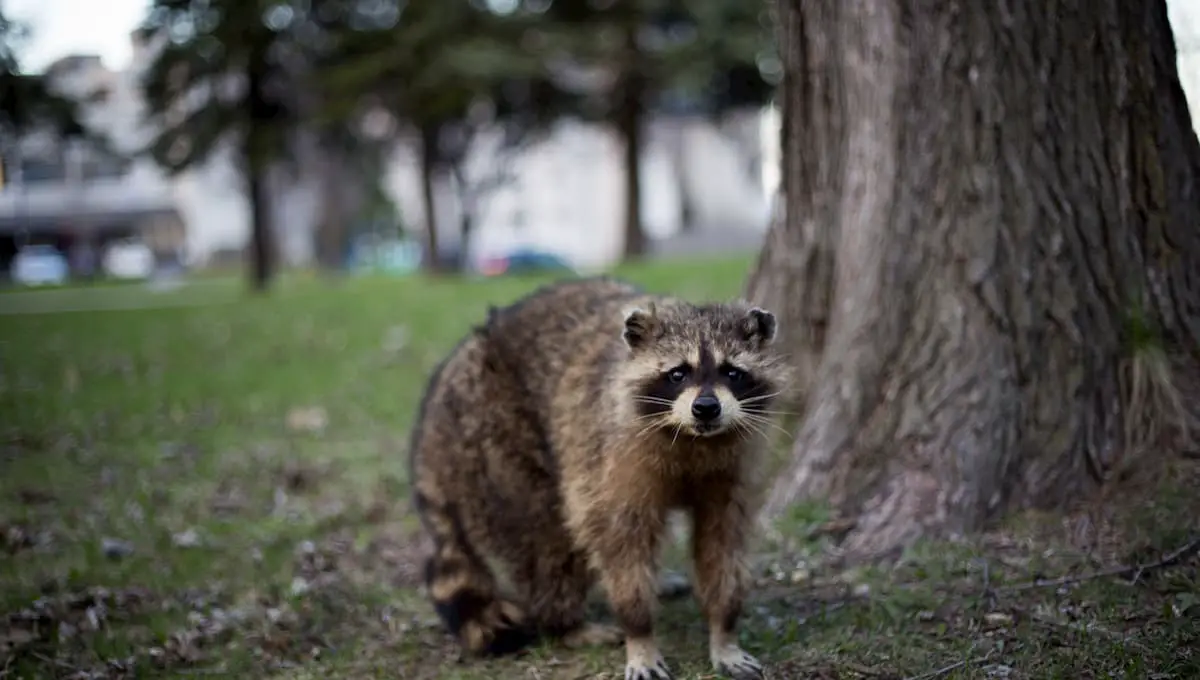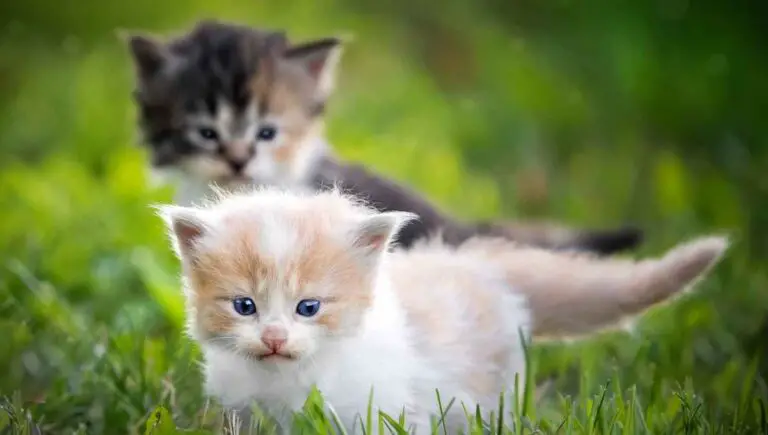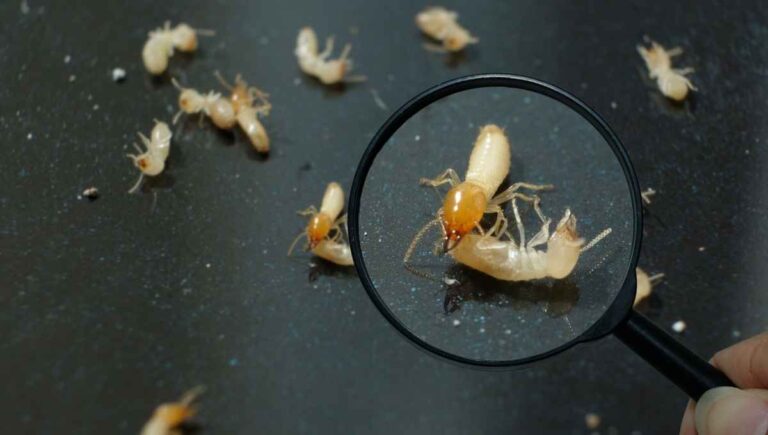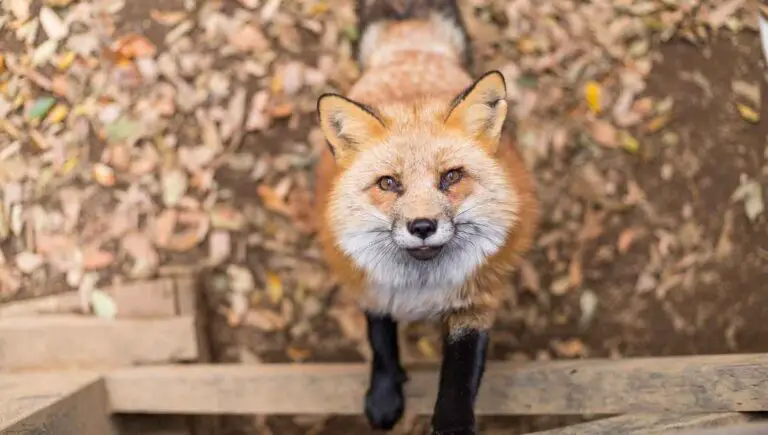How To Get Rid Of Raccoons in the Yard Fast

Raccoons may look like cute animals, but they’re destructive, and sometimes dangerous pests. Reclaim your home by learning how to get rid of raccoons in the yard for good, using preventive measures, scare tactics, repellents, and humane removal solutions.
Raccoons are agile, strong, and intelligent mammals that are incredibly adaptive to most environments. All raccoons require is access to food, shelter, and a water supply. If you see a raccoon in the backyard at night rifling through your bins, or trampling your garden, they’re likely foraging for something to eat.
Once a group of raccoons have taken up residence in your home, it becomes challenging to remove them, primarily when the group comprises a protective mother raccoon and her young.
Our principal objective of this article is to provide you with ways to prevent your private abode from becoming overrun by raccoons. We’ll show you methods on how to get rid of raccoons in attics, in your garden, and away from your family and pets.
What Are the Signs That I’m Dealing With Raccoons?
One of the more apparent signs that raccoons have invaded your property is the sight of ransacked garbage bins, where strong odors of overflowing garbage may attract these creatures.
Due to their human-like hands, opposable thumbs, and the ability to stand on their hind legs, an opportunistic raccoon can pry open bins that aren’t adequately secured.
As raccoons are primarily nocturnal, it’s hard to catch them in the act.
Scan the exterior of your home and look for claw marks and damage. Raccoons can tear and rip apart weak areas of your home’s foundation and can identify the smallest entryways to your home. Sealing shut gaps and holes is the first step you can take to prevent raccoons from taking up permanent residence.
What Attracts Raccoons to Your Yard?
Raccoons are omnivores; they’re a robust type of species that eat nearly everything; from plants and human waste to leftover pet pellets and bird feed. If you feed your cats or dogs outside, remember to bring their bowls in at night because your domesticated animal food is a tempting midnight treat.
Another way of determining whether your unwanted nighttime visitors are raccoons is by identifying their tracks. They have distinctive paw prints that are much larger than other breeds of pests, such as skunks.
The hind print is approximately three and a half to four and a half inches long while the fore print is three inches long, with a foot difference between the two parts of the foot.
An open swimming pool is often used as a latrine by a raccoon because the water masks the odor, thus making it more challenging for them to be hunted by predators.
If you see droppings in your pool at night, make sure to remove them because the faeces may contain roundworms, which is toxic to humans, especially young children.
Facts About Raccoons: Are Raccoons Dangerous?
Several homeowners are frightened by the idea of encountering raccoons, thinking that they are rabid, dirty, and rabies-infected pests that must be exterminated immediately.
The reality is that while raccoons carry diseases, including rabies, they are more destructive than aggressive, and may only attack when they’re defending their young or feel cornered and threatened.
What Do You Do If You See a Raccoon At Night?
Don’t try to chase them because, weighing in at ten to 30 pounds, these wild animals are strong and can defend themselves. Instead, keep your distance, call in animal control to have them removed, or utilise DIY methods that will, hopefully, drive out a family of raccoons.
What Do You Do If a Raccoon Approaches You?
As a result of their growing use to living in urban areas, pests like these are no longer afraid of humans. However, as we’ve previously mentioned, raccoons aren’t aggressive unless their survival depends upon it, or they’re sick.
Temporary scare tactics you can use to deter these critters, if only temporarily, include making yourself appear bigger by stretching out your arms, making loud noises such as shouting or clapping your hands, or spraying them with water. They might return once there is no longer a threat around, but this will give you the chance to retreat to safety.
Will A Raccoon Attack You?
The chances aren’t very likely but may occur if you separate a mother from its babies or if a raccoon has rabies.
Signs that a raccoon has rabies includes the creature, wandering about your property in the daytime (raccoons are generally nocturnal), acting abnormally aggressive, erratic, and being extremely vocal.
If the above occurs, and you are wondering, “should I call animal control for a raccoon”? The answer is yes. Unfortunately, rabies cannot be cured, and is, therefore, a death sentence for these pests. Wildlife professionals will know how to dispose of them humanely.
What Are Some Preventive Measures I Can Take to Prevent an Invasion?
Convincing raccoons to leave is only half the solution. You may find that six months from now, you have a new family of unwanted visitors because your home is unprotected from enterprising raccoons.
How To Get Rid Of Raccoons For Good?
Seal Holes Around Your Siding, Roof, And Foundation
Raccoons are known to build dens in your attic, chimney, side vents, and other parts of your home.
They’re intelligent animals who can pull, tear, and rip things up that prevent them from gaining access into your home – a hole as small as three inches is enough for a raccoon to paw its way through.
Seal holes around the home with non-permeable materials such as wood, caulk, concrete, and expandable foam.
Install Perimeter Fences
So how do you keep raccoons away naturally?
Many homeowners have found that constructing electric fences are effective in keeping unwanted wildlife out.
That said, you should know that a standard, non-electric fence is an ineffective barrier against raccoons. In the wild, raccoons are adept tree climbers, and won’t be deterred by your gate’s height, while their babies can easily squeeze through small spaces.
Barrier Screens
As we’ve already mentioned, raccoons don’t discriminate with food, and your prized plants may be a nutritious food source for them.
Save your garden from destruction by covering it with mesh or create a physical barrier made from durable materials.
Mesh, as well as plywood, aren’t just useful in the garden, but can also be used to block possible entryways.
Keep Your Home Clean And Hygienic
An untidy or unkempt home where garbage is dumped unceremoniously outside or where dirty dishes pile up is an open invitation not just to raccoons but a variety of unwanted pests.
Therefore a simple way on how to get rid of raccoons and possums, as well as other uninvited guests is to clean up after yourself. Make sure your garbage bags are inside the trash can, not around or on top, and ensure that the lid is sealed shut. A crafty way to prevent raccoons from digging through your rubbish is by tying the ends with a bungee cord or installing a raccoon-proof lock.
Rake Discarded Vegetation and Cut Back Shrubs
There are one of two reasons. The trees in your yard may hang over the roof of your home, granting pesky raccoons access to your interior. Cutting back the leaves or overhanging branches may be in your best interest.
Having fruit trees may appeal to your wanted guests, especially when the fruit is left unpicked and begins spoiling.
Pick your fruit as it ripens and rake up rotting fruit off the ground so as not to attract raccoons to your yard.
What Will Scare Away Raccoons?
Raccoons might be large animals, grown used to living amongst humans, but they’re also quite low on the food chain and are vulnerable to multiple predators. The trick is to emulate sudden sounds and movements to frighten off raccoons.
Search online, and you’ll see that there are several scare tactics mentioned on how to scare raccoons. To optimize their effects, these should be combined to create multi-sensory harassment that’s perceived as a threat to their recipients.

People often use motion sensor devices that are activated when movement is detected, such as motion-activated sprinklers, lights, and ultrasonic devices that emit unpleasant sounds, undetectable to humans and pets.
What Time Of Night Are Raccoons Are Most Active?
Knowing the answer to this question is essential as the scare tactic may only work when the species is out and above, foraging for food, and not nestled in your attic following its nighttime activities.
Around dusk is the best time of day to catch them unawares, although, due to their nocturnal nature, you may be able to scare them off throughout the night while they are rustling through your bins or obliterating your yard.
What Is A Natural Deterrent For Raccoons?

Pets can help to ward off raccoons but only dogs larger than them. Think twice before you set your beloved animals on the raccoons, however, because they do bite and may infect your dog with a trifecta of life-threatening diseases, including canine distemper.
Product Picks


- Protect your home from unwanted pests and raccoons with the Yard Enforcer Motion-Activated Sprinkler.
- The Outdoor Motion Sensor Activated Spotlights by Mr.Beams helps get rid of your raccoon problem by turning on and activating the moment any motion is detected within the vicinity, thus scarring away the raccoons with the bright LED lights.
Does Homemade Raccoon Repellent Work?
As many professional pest and animal control websites stress, raccoon repellent doesn’t work because a bad odor won’t prevent raccoons from vacating your home and yard, especially when the outdoors is rife with predators and other unknown dangers.
So if your inquiry is will raccoons leave on their own because you’ve made their place of residence less hospitable? The answer is that they do work for the short-term, but will become less effective once the raccoon grows used to the smell or learns to avoid the areas from which the aroma comes.
What Do Raccoons Hate the Smell of?
It’s worthwhile to note that, because raccoons have a heightened sense of smell, they’re averse to many foul and offensive scents.
One tried-and-true natural method is soaking cotton in ammonia and placing them around your property. Raccoons may appear extremely messy and hazardous, but they are clean animals and won’t like the potent smell of urine permeating the areas where they eat and sleep.
Will Bleach Keep Raccoons Away?
Bleach sprinkled over your bins will keep these animals away from your trash temporarily. However, they will return once the smell disappears or becomes more tolerable.
Does Irish Spring Soap Keep Raccoons Away?
Despairing gardeners whose lawns and plants should sprinkle small pieces of Irish Spring soap around their property to save their garden from wrack and ruin because the smell and taste is not favorable to a family of raccoons.
Other homemade remedies you can concoct inexpensively, which have received varying degrees of success include pepper-and-spice-infused sprays. Unlike humans, raccoons are repelled by spicy food and seasoning.
Home Depot stores across North America sell predator urine to deter raccoons from building nests in your home. The threatening smell may encourage the group of critters to leave of their own accord.
Product Picks
- Keep critters out of the yard with 100% pure Coyote Urine from Harmon Scents.
How to Get Rid of Raccoons Under Decks

Many homeowners complain about noisy raccoons camping out in their attics or making huge messes. Yet, raccoons are highly adaptable creatures that can live anywhere where there’s ample protection from predators and a food source nearby, including decks and ceilings.
So how do you get rid of raccoons in the ceiling, deck, and other unlikely places where you can hear but not see them?
You can use various natural methods, such as soaking rags in vinegar and placing them in the vicinity of the raccoon’s hiding spot or call in the professionals.
Not only will these creatures be carefully and quickly removed, but the pest control company you hire can point to the areas where the raccoons are entering your home. To avoid another invasion, you should repair the parts of your home that are porous and breaking, such as cracks and gaps.
Should I Consider Animal Trapping?
Some homeowners may turn to animal catching where other approaches have failed. Despite cages being a surefire way of removing unwanted pests, many professionals advise against this. Why? Setting up animal traps if you have no prior experience is complicated.
Before even purchasing an animal cage, you must first read up on your state laws. Trapping and freeing raccoons, and other types of pests could be illegal in your region as raccoons are rabies vector species, meaning they’re known carriers of the life-threatening disease.
There may also be conditions linked to removing raccoons from your premises, such as having to obtain a special permit.
Dangers and Disadvantages of Animal Trapping
If you have permission to trap animals in your backyard, there are several factors you must take into consideration.
Find The Right Cage
The trapped raccoon will try to escape the cage, and may effortlessly gnaw or rip its way out of one that is made from non-durable materials.
Product Picks
- Trap raccoons in the robust, rust resistant HomGarden Live Animal Trap or the Trapro Live Animal Cage Trap (large)


Trap Location and Checks
Traps should be set in the shade, and not directly in the sun where a caged raccoon is vulnerable to heatstroke, from which they could die. You must also check these cages frequently as leaving them for a few days could result in you finding a dead, starved, or dehydrated raccoon.
Use Bait To Target The Right Animal
A risk you take by capturing raccoons this way is that you may trap the wrong animal accidentally, such as the neighbor’s overly curious cat.
One way to prevent this from occurring is to use bait that won’t appeal to other animals, taking note that a raccoon’s diet is diverse. Instead of leaving pieces of meat which may attract non-targeted wildlife, lure the raccoon in with something sweet.
Avoid Using Traps In The Attic And Confined Spaces
Raccoons hiding out in your attic are generally mothers with their babies. By trapping the mother, you risk leaving the young behind, who will die if they aren’t cared for by an adult raccoon.
The mother, now relocated miles away, will try to make her way back to her babies and may die along the way.
Does Animal Control Get Rid Of Raccoons?
They do, and it’s probably better to call up the professionals when mothers and babies are concerned, to ensure the relocation doesn’t separate the family. Otherwise, wait a few months to capture raccoons when the young have grown.
There are disadvantages to setting up your own trap; you could inadvertently be putting the animal in harm’s way, which is why it’s advisable to call up a professional with the adequate training and experience handling and safely removing unwanted wildlife.
Recap: What Should I Do if I See a Raccoon in My Yard?
If you’re searching for ways to remove raccoons in the yard, you probably have an infestation or suspect there are raccoons about to move in.
Many individuals vilify raccoons, regarding them as dangerous because they carry disease. Is it bad to have raccoons in your yard?
The truth of the matter is that raccoons are destructive pests that should be removed from your home, but they are rarely ever aggressive, unless provoked or sickly. In this article, we’ve expressed the following:
- We’ve explained the signs that a raccoon has visited your property, namely spilt trash, a wrecked garden, droppings in the pool, and more.
- We’ve identified preventive measures to keep raccoons from entering your yard in the first place, which include sealing openings around the exterior of your home and constructing physical barriers.
- We’ve described that while raccoons are opportunistic scavengers, they rarely attack, which begs the question, “are raccoons dangerous at night”?. No, but you should report sightings of raccoons during the day to animal control because they could be rabid and infected by rabies.
Does animal control kill raccoons? Ones that are sick could infect other animals and humans, so it becomes a necessity to euthanize them..
- We’ve looked at scare tactics, which can work, but some may be costly to install. Having large pets may intimidate raccoons, but you could be putting your animal’s health at risk if the critter is diseased.
Another concern you may have is “do raccoons fight to the death?” They probably would in order to protect their life, which may result in you potentially losing your beloved pet. Call in the experts instead.
- We’ve explained the pros and cons to animal trapping, and why you should contact a professional if you don’t have the skills and know-how to set one up.






